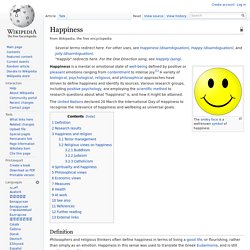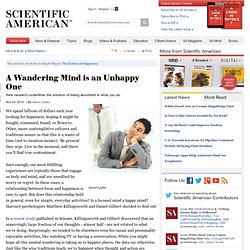

Lifestyle and Emotional Well-Being, with Dr. Andrew Weil. Happy Vs Meaningful Life. As psychologists zero in on the key to a good life, it's becoming clear that there are two distinct paths.

A forthcoming paper by Roy Baumeister, Kathleen Vohs, Jennifer Aaker, and Emily Garbinsky in the Journal of Positive Psychology looks at the difference between a happy life and a meaningful life. Here's the abstract: Being happy and finding life meaningful overlap, but there are important differences. A large survey revealed multiple differing predictors of happiness (controlling for meaning) and meaningfulness (controlling for happiness).
Satisfying one’s needs and wants increased happiness but was largely irrelevant to meaningfulness. In short, a meaningful life involves suffering for a greater cause. The study, based on multiple surveys of 397 adults plus past research, found that people can feel both happy and meaningful — indeed the two feelings reinforce each other — but at some points you may have to choose. The authors hope you'll choose meaningfulness: Www.latornell.ca/files/2012_sessions/Latornell_2012_T3D_Elizabeth_Nisbet.pdf. Happiness. Happiness is a mental or emotional state of well-being defined by positive or pleasant emotions ranging from contentment to intense joy.[1] A variety of biological, psychological, religious, and philosophical approaches have striven to define happiness and identify its sources.

Various research groups, including positive psychology, are employing the scientific method to research questions about what "happiness" is, and how it might be attained. The United Nations declared 20 March the International Day of Happiness to recognise the relevance of happiness and wellbeing as universal goals. Definition Philosophers and religious thinkers often define happiness in terms of living a good life, or flourishing, rather than simply as an emotion. Happiness in this sense was used to translate the Greek Eudaimonia, and is still used in virtue ethics. Happiness is a fuzzy concept and can mean many different things to many people. Research results Happiness and religion Terror management Buddhism Judaism. Matt Killingsworth: Want to be happier? Stay in the moment. Www.wjh.harvard.edu/~dtg/KILLINGSWORTH & GILBERT (2010).pdf.
A Wandering Mind is an Unhappy One. We spend billions of dollars each year looking for happiness, hoping it might be bought, consumed, found, or flown to.

Other, more contemplative cultures and traditions assure us that this is a waste of time (not to mention money). ‘Be present’ they urge. Live in the moment, and there you’ll find true contentment. Sure enough, our most fulfilling experiences are typically those that engage us body and mind, and are unsullied by worry or regret. In these cases, a relationship between focus and happiness is easy to spot. In a recent study published in Science, Killingsworth and Gilbert discovered that an unnervingly large fraction of our thoughts - almost half - are not related to what we’re doing.
The ingredients of simple, everyday happiness are tough to study in the lab, and aren’t easily measured with a standard experimental battery of forced choices, eye-tracking, and questionnaires. What about the kinds of activities we do, though? Why are our brains so intent on tuning out?